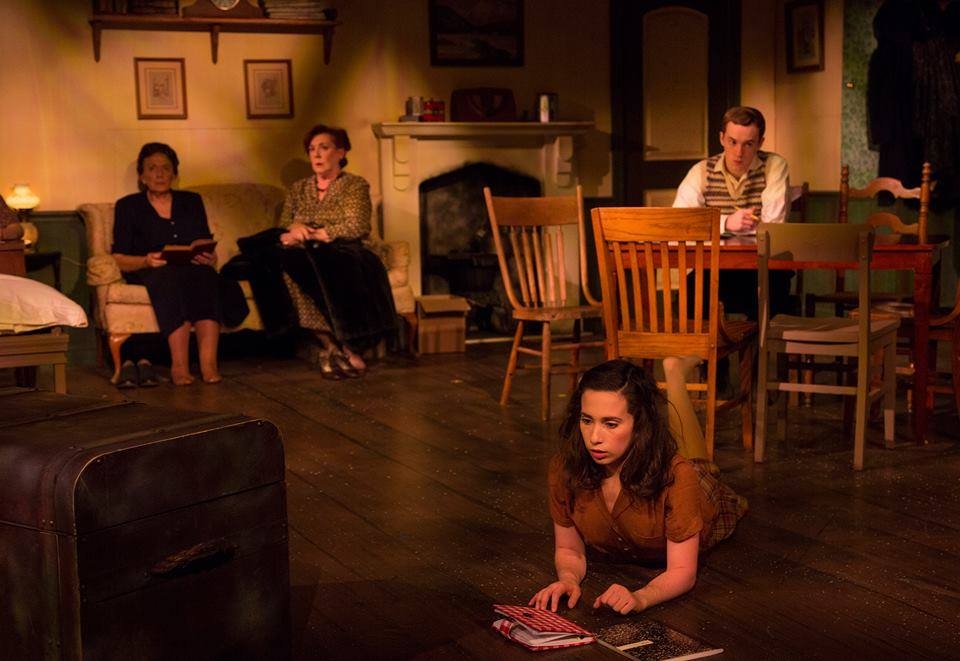Regardless of the form it takes or how much time has passed since a now-famous adolescent girl documented her life in a red checkered notebook while in hiding from the Nazis during World War II in Amsterdam, “The Diary of Anne Frank” remains powerfully moving.
I was but an adolescent girl myself when I first encountered the text, and now decades later, I found myself teary eyed by the end of Farmers Alley Theatre’s excellent production, which beautifully dramatizes the inspiring and horrifying true story with strong performances and evocative technical choices.
Based on Wendy Kesselman’s rewrite of Frances Goodrich and Albert Hackett’s 1955 Tony Award-winning play based on the diary, this particular script largely focuses on the complexity of the characters and the strain on their relationships this nearly impossible set of circumstances presents.
Originally published in 1947, the diary spans from July 1942 through August 1944, when Anne Frank, her family and family friends lived together in hiding, mostly in silence, and amid little more than a handful of rooms with not much besides rotten potatoes and pickles to eat, and reading, writing and knitting to pass the time.
During the two years of exile before they were violently captured and hauled to concentration camps and all but one of their deaths, Anne Frank quite boldly emerges on the pages of her diary: full of impudence and impatience, she longs to be known and touched, and buoys the spirits of those around her the best she can while hungering deeply for the world beyond the limits of the annex walls she fears she may never know.
In the Farmers Alley Production, Anne prances around enthusiastically, running, skipping and pirouetting around the claustrophobic little space she shares with seven other weary souls while her father reminds them “one mistake could cost us our lives.” Quite literally, she’s up in everyone’s faces, vibrant and irritating, as only a very bold 13-year-old girl can be. As directed by Adam Weiner, Julianna Hirsh isn’t an entirely likable Anne Frank, and ultimately it works quite well for the show because of how it sets up the profound yet subtle changes she undergoes.
Nearly all of the characters here are too utterly flawed and human to be entirely likable, save for Anne’s father, played exquisitely by Fredric Stone, one of two Equity actors in the cast. He’s a consistently calming presence — compassionate, in command and warm amid the many conflicts and spats that ensue in the annex. Ben Zylman rises to his level of artistry with his tremendous portrayal of Mr. Dussel, a traumatized and devout dentist who joins the two families in hiding. Zylman contains lifetimes of suffering as well as glimmers of humor, joy and desire amid the pain in facial and physical gestures alone.
Many of the other performers play to the caricatures presented in their characters, but they also find and express their respective intrinsic humanity, which, ultimately, makes for an overall dynamic and touching performance.
Also notable, the technical choices and the space itself — Farmers Alley’s first return to their intimate black box space in downtown Kalamazoo after a stretch of displacement for city construction — offer elegant storytelling devices. Alex Tobin’s sound design presents glimpses of the terrifying world outside the annex: thunder and lighting, percussive soldiers’ marching footfalls, a train whistle to signify the harrowing journey to Bergen-Belsen as well as snippets of BBC news reports and clips of Hitler’s speeches.
The beautiful marriage of Weiner’s direction coupled with W. Douglas Blickle’s intimate set and George Eric Perry’s dramatic lights reaches its zenith in the final minutes of the play. Nazis appear silently while the adults play cards and the children enjoy a rare moment of sensual pleasure, and in the juxtaposition of the split scene, the wretched injustice and dissonant violence happens largely in the imagination of the audience.
And in the very final moments, during Mr. Frank’s heart-wrenching soliloquy, delivered with great emotion by Stone with diary in hand, the writing is quite literally on the wall.
“The Diary of Anne Frank” is so much more than a cautionary tale. It is so deeply devastating and enduring that 70 years after its publication, sprung boldly to life on Farmers Alley’s stage, it feels closer than ever.
The Diary of Anne Frank
Farmers Alley Theatre
Nov. 3-19
farmersalleytheatre.com





